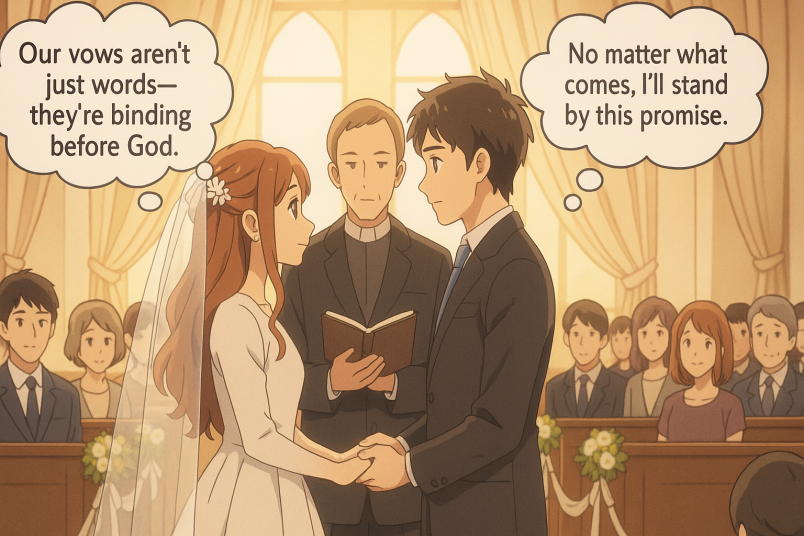What Is a Covenant Marriage? Everything You Need to Know

Heal & Grow Daily for a Happier Relationship
Subscribe FREEKey Takeaways
Marriage.com AI Quick Summary
Marriage means many things to different people, from love and partnership to faith and a lifelong promise to never give up. But for some couples, that promise takes on a deeper, more formal meaning through what’s known as a covenant marriage.
It’s not just about romance or ceremony; it’s about commitment with purpose and structure.
You might wonder, what makes it so unique?
Is it harder to leave, or simply stronger by design?
The idea sounds both beautiful and challenging at once, because it asks couples to slow down, reflect, and truly mean every word they say. It’s a rare choice, but for those who take it, it represents something profoundly intentional, a love meant to endure, even when tested.
What is a covenant marriage?
Understanding the marriage covenant is not too difficult. The marriage covenant in the Bible was the basis of the covenant marriage first adopted by Louisiana in 1997. The name itself gives solid value to the covenant of marriage, so it will be hard for couples to simply end their marriage.
By this time, divorce had become so common that it may have lessened the sanctity of marriage, so this was their way of ensuring that a couple wouldn’t abruptly decide to divorce without a solid and valid reason.
The best covenant marriage definition is the solemn marriage agreement that a couple agrees to sign before marriage. They have to accept the marriage agreement, which promises that both spouses will do their best to save the marriage. They also agree to undergo premarital counseling before getting married.
If they encounter problems, they’d be willing to attend and sign up for marriage therapy for the marriage to work. Divorce is never encouraged in such a marriage. However, it is still possible, given the circumstances of violence, abuse, and abandonment. Therefore, covenant marriage divorce rates may be low.
Researchers surveyed 1,324 adults in Louisiana, Arizona, and Minnesota to explore public opinions on covenant marriage and divorce. Findings suggest such policies appeal more in religiously active, conservative states; conservative, religious individuals are likelier to choose them; partial legislation gains broader support; and initiatives generally avoid sociodemographic division.
5 legal requirements of a covenant marriage
A covenant marriage isn’t just about two people saying “I do.” It’s about entering a legally recognized form of marriage that emphasizes faith, accountability, and long-term commitment. Many couples see it as a promise not just to each other, but also to their values and beliefs. So, what exactly makes it different legally? Let’s look at the main requirements that define it.
1. Premarital counseling
Before a covenant marriage can take place, couples must attend premarital counseling with a licensed counselor, clergy member, or religious advisor. This step encourages honest discussion about expectations, communication, and problem-solving.
It’s meant to help both partners understand the seriousness of the commitment they’re making. Think of it as building emotional readiness before signing anything official.
Here’s how it actually goes:
- Couples meet for a few guided sessions focusing on faith, conflict resolution, and shared goals.
- They discuss personal beliefs about marriage, children, and long-term partnerships.
- The counselor provides a certificate confirming completion, which is required for the marriage license.
2. Declaration of intent
Couples must sign a formal declaration of intent, acknowledging that they’re entering marriage for life. This document often includes promises to seek help during conflicts and to view marriage as a permanent union.
It’s a conscious choice to slow down, reflect, and commit wholeheartedly. Many couples find it symbolic to say, “We mean forever.”
Here’s how it actually goes:
- Both partners read and sign a written statement affirming their lifelong commitment.
- The declaration is usually filed with the marriage license application.
- Some couples include personal vows or religious texts to deepen its meaning.
3. Legal statement of understanding
Along with the declaration, both partners must sign a legal statement that outlines what a covenant marriage entails. This includes acknowledging the limited grounds for divorce and the need for counseling before separation.
The document helps ensure that each person truly understands their rights and responsibilities. It adds clarity—and a sense of shared accountability.
Here’s how it actually goes:
- The statement is provided by the state and must be reviewed before signing.
- It lists specific conditions under which divorce or separation is legally allowed.
- Couples sign in front of a notary or authorized official to make it legally binding.
4. Limited grounds for divorce
Unlike standard marriages, covenant marriages restrict the reasons a couple can legally divorce. Grounds usually include abuse, adultery, felony conviction, or abandonment. This makes it harder to dissolve the union based on “irreconcilable differences.”
The purpose isn’t to trap anyone, but to encourage reconciliation whenever possible… while still protecting those in unsafe situations.
Here’s how it actually goes:
- Couples must show valid proof of one of the listed legal grounds.
- The court reviews counseling records or documentation before proceeding.
- If none of the grounds apply, the couple may need to pursue counseling again.
5. Mandatory counseling before separation or divorce
If problems arise, the couple must seek counseling before pursuing separation or divorce. This rule is designed to promote understanding, reflection, and problem-solving rather than quick decisions.
Is marriage a covenant in this sense?
Absolutely—it’s meant to remind both partners that healing often begins with honest effort, not escape.
Here’s how it actually goes:
- The couple attends counseling sessions with a licensed or faith-based counselor.
- The counselor focuses on communication, forgiveness, and rebuilding trust.
- Proof of counseling completion is often required before the legal process can continue.
How does a covenant marriage differ from a standard marriage?
A covenant marriage might look like any other marriage from the outside, with the vows, the rings, and the celebration, but legally and emotionally, it asks for something deeper.
It’s built on the idea that marriage is a lifelong commitment, not just a contract that can easily be ended when things get tough. For some, that’s comforting; for others, it feels like a serious leap of faith.
So how exactly does it differ from a standard marriage? Let’s take a closer look.
| Aspect | Covenant marriage | Standard marriage |
|---|---|---|
| Premarital counseling | Required before obtaining a license; focuses on communication, faith, and long-term expectations. | Optional and not legally required. |
| Legal declaration | Couples sign a special “Declaration of Intent” promising lifelong commitment. | No additional legal declaration beyond the marriage license. |
| Grounds for divorce | Limited to specific reasons like abuse, adultery, or abandonment. | Broader reasons allowed, including “irreconcilable differences.” |
| Counseling before divorce | Mandatory counseling is required before filing for divorce or separation. | Counseling may be recommended, butit isn’t legally required. |
| Purpose | Designed to strengthen commitment and promote reconciliation. | Focused primarily on legal recognition of marriage. |
Covenant marriage adds layers of reflection, counseling, and accountability that a standard marriage doesn’t require.
It’s not meant to make life harder, but to remind couples that lasting love often needs intention, patience, and faith. For those who choose it, the goal isn’t perfection; it’s perseverance, even when love feels tested.
A study explored covenant marriage as an alternative marital form that aligns with traditional gender roles. Focusing on Louisiana, it notes the limited adoption of the model but strong appeal among couples with conservative, gendered values, suggesting its relevance for those upholding traditional family responsibilities.
7 defining characteristics of a covenant marriage
A covenant marriage is more than just a piece of paper; it is a promise that carries both spiritual and legal meaning. It is built on the belief that love thrives when nurtured with patience, communication, and accountability.
Couples who choose this path often do so to strengthen their bond and remind themselves that commitment is a daily choice, not just a single moment. Here are 7 defining traits that make a covenant marriage truly unique.
1. A deep sense of lifelong commitment
At the heart of a covenant marriage lies a shared belief that marriage is meant to last a lifetime. It is not entered lightly or for convenience but with genuine intention and faith.
Couples promise to work through struggles, celebrate small victories, and grow together even when life feels hard. It is a reminder that real love is built on effort, not escape, and that promises matter even when tested.
- Remember this: True commitment does not mean never facing challenges; it means facing them together. Every time a couple chooses patience over frustration or understanding over pride, they strengthen the foundation that keeps love steady through every season of life.
2. Required premarital counseling
Before tying the knot, couples are asked to complete premarital counseling with a licensed counselor, minister, or spiritual advisor. These sessions create space for open conversations about expectations, values, and potential challenges.
It is a chance to ask, “What does marriage mean to us?” and truly listen to each other’s answers. The process helps partners begin their journey with clarity, emotional honesty, and a stronger understanding.
- Remember this: Counseling is not about finding flaws; it is about learning how to communicate with compassion. These early conversations can become the building blocks of trust, empathy, and mutual respect, tools every lasting relationship needs to thrive.
3. A formal declaration of intent
Every couple entering a covenant marriage signs a declaration of intent that symbolizes their lifelong promise. This document includes commitments to seek help during conflicts and to honor the sacredness of their union.
Signing it feels meaningful; it is a pause to reflect on what forever really means. For many, it is both a legal step and a heartfelt expression of love and accountability.
- Remember this: Writing and signing a declaration is more than paperwork; it is a sacred moment of awareness. It encourages couples to slow down, look each other in the eyes, and say, “We are choosing this with all our hearts.”
4. Limited grounds for divorce
Unlike standard marriages, covenant marriages set specific conditions for divorce, such as adultery, abuse, or abandonment. This rule is meant to protect the idea of commitment, not to punish those in difficult situations.
It encourages couples to exhaust every effort for healing before separation becomes an option. The hope is that love, understanding, and guidance can often rebuild what once felt broken.
- Remember this: Setting boundaries around divorce is not about restriction; it is about intention. It asks both partners to pause, reflect, and seek restoration when possible, while still honoring the right to safety and dignity if the relationship becomes harmful.
5. Counseling before separation or divorce
If a couple faces serious issues, counseling becomes a necessary step before legal separation or divorce. This allows both partners to reflect, communicate, and decide whether reconciliation is possible.
Sometimes, talking openly with a professional can bring clarity and peace, whether that means staying together or parting respectfully. It is about giving love one more chance to be understood before giving up completely.
- Remember this: Seeking counseling during hardship is not a sign of failure; it is a sign of courage. Taking time to listen, cry, and reconnect often reveals hope where it once seemed lost.
6. Strong faith or moral foundation
Many couples who choose covenant marriage do so because of shared faith or moral beliefs. They see marriage as something sacred, guided by values that go beyond personal happiness.
This foundation often strengthens their bond, helping them stay grounded during disagreements or life’s unexpected turns. It reminds them that love is not just an emotion, but a purposeful act of devotion every single day.
- Remember this: Faith and values can become anchors when emotions waver. When couples return to their shared beliefs, they often rediscover patience, forgiveness, and a deeper sense of unity.
7. Emphasis on personal growth and unity
Covenant marriage invites couples to grow not just as individuals, but as a team. Through open dialogue, forgiveness, and shared goals, they learn to handle challenges with maturity and grace.
It is a journey that values progress over perfection and patience over pride. Over time, this growth transforms ordinary companionship into something deeper, a true partnership rooted in empathy, faith, and understanding.
- Remember this: Growth does not happen overnight; it unfolds in small, steady steps. Each effort to listen, heal, or adapt strengthens the bond between two people who keep choosing love, even when it is hard.
Why do some couples choose a covenant marriage?
Choosing a covenant marriage is often a heartfelt decision, not a legal one. For many couples, it feels like taking an extra step toward honoring love with intention and faith. It is about saying, “We are in this for the long run,” and genuinely meaning it.
Some couples are drawn to the deeper spiritual meaning; others simply want the reassurance that their marriage is built on strong, lasting values. Whatever the reason, this choice usually comes from a place of hope, not obligation.
Here are a few common reasons couples decide on a covenant marriage:
-
They discourage divorces
Unlike traditional marriages, covenant marriages are non-traditional, but these marriages discourage divorce because it’s a clear disrespect to the covenant of marriage.
We all know that when we tie the knot, we just don’t do this out of fun, and that when you no longer like what is happening in your marriage, you can immediately file for divorce.
Marriage is a serious commitment, and this type of union reminds couples to approach it with sincerity and care.
-
You get a second chance
You get the chance to work things out for the better. Before you get married, you are already required to attend premarital counseling, so you’d already know what you are getting yourself into.
A few good tips in pre-marriage counseling can already build a strong foundation for your married life.
-
You try to make it work
When you’re faced with problems and trials, the couple would instead do their best to work things out instead of opting for divorce. They lean on patience and empathy, remembering why they chose each other in the first place.
Isn’t marriage all about trying to be the best for your spouse?
According to Maggie Martinez, LCSW:
In a covenant marriage, the promise isn’t perfection—it’s presence
So in your journey of marriage, you are given a chance to be better together and see how you can grow with your partner.
-
Strengthens families
It aims to strengthen families and teach married couples that marriage is a sacred union and that no matter how hard the trials are, you and your spouse should work together to better yourself and your family.
When couples grow stronger, children often feel more secure and loved, creating a healthier home environment. Over time, that unity becomes a quiet example of faith, patience, and resilience for the entire family to follow.
What are the reasons for leaving a covenant marriage?
The reasons for leaving a covenant marriage are minimal. No-fault divorces are not an option in covenant marriages. Reasons on the grounds of which one can seek a divorce in a covenant marriage are as follows:
- The non-filing spouse committed adultery
- The non-filing spouse committed a crime and received a sentence
- The non-filing spouse abandoned the house for more than one year
- The non-filing spouse committed emotional, sexual abuse, or violence
- The couple has lived separately for more than two years
- A court has granted legal separation to the couple, and they have not lived in their marital home for more than one year
- Both spouses agree to the divorce
- The non-filing spouse abuses alcohol or some substance.
So, what do you do if you want to leave a covenant marriage?
If any of the above reasons are valid in your marriage and you are planning to seek a divorce in a covenant marriage, here is what you should do.
- Document ill-treatment, sexual abuse, and domestic violence
- Document the marriage counseling you receive
- Document all essential dates
- Document all circumstances that support your grounds for divorce.
How to convert a traditional marriage to a covenant marriage
Under some circumstances, a couple may need to convert their traditional marriage into a covenant marriage. When you have a traditional marriage, you can convert it into a covenant marriage. However, if you have a covenant marriage, you can not convert it into a non-covenant marriage.
Maggie Martinez Reid highlights that:
Covenant marriage is a commitment to growing not just together but individually through discomfort, healing, and the hard work of staying connected.
To convert a traditional marriage into a covenant marriage, you may have to pay a fee to the appropriate court and submit a declaration of intent.
You may also have to submit the date and time of your wedding. You may find a pre-printed form with some courts to simplify the process.
Watch this video, in which Dr. Tony Evans from Lakepointe Church shares how marriage is a sacred covenant rooted in faith, love, and lasting commitment:
Choosing commitment with intention
A covenant marriage is not just about laws or papers but about intention, faith, and deep commitment. It reminds couples that love is something to be chosen, protected, and renewed every day.
Sure, it takes effort, honesty, and a lot of patience, but isn’t that what lasting love is all about?
Maggie Martinez adds that:
With a covenant marriage, you are committing to work through any difficulties with your spouse within reason.
Whether you see it as a spiritual promise or a heartfelt decision, it teaches one simple truth: strong relationships do not just happen; they are built slowly, with trust and care, through every season of life.
Want a healthier, happier relationship - one step at a time?
 Tips
Tips
Write your tip or submit a video tip
All tips are reviewed before the publishing.
Share this article on
Recent Articles
Related Quizzes
Heal & Grow Daily for a Happier, Healthier Relationship
Subscribe FREE on YouTube We'd love your feedback!
We'd love your feedback!
 Expert Q&A
Expert Q&A
Ask your question related to this topic & get the support you deserve from experts.





















 Thanks for your feedback!
Thanks for your feedback!